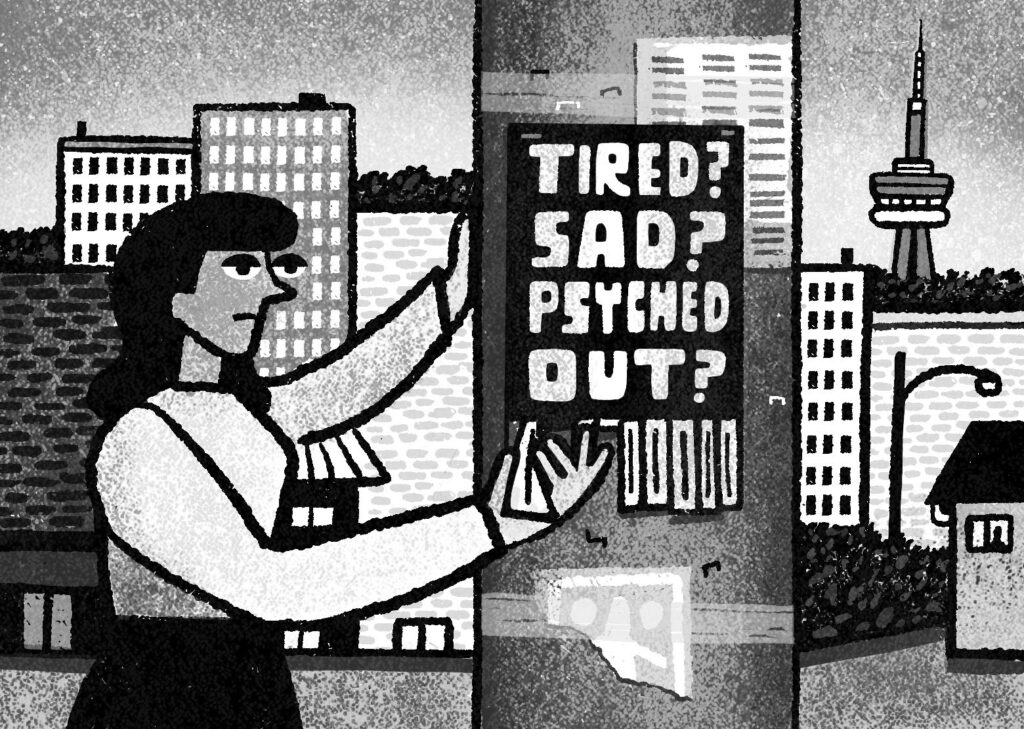It makes sense to set a book about emotional well-being in a time before the internet: Before social media waged psychological warfare on our tender self-worth. Before the comments section became the place where fellow feeling goes to die. Turn back half a century to the blazing hot spring and summer of 1971. Sweat drips down spines as cigarette smoke curls into the air. In the clammy basement of a church in Toronto’s West End, four strangers gather in response to an advertised session: “Tired? Sad? Psyched out? Do yourself a solid. Try Group Therapy. It’s new! It’s experimental!” All hang‑ups welcome, we’re told.
In some respects, Back to the Garden seeks to return to an age of apparent innocence, when the culture of wellness and self-actualization was free of jadedness and jade eggs and when the simple act of voicing innermost fears and feelings, in public, could be a revelatory, even revolutionary experience. The man behind this “newfangled” approach — or, as one of the less sympathetic people calls the group sharing idea, “quackery”— is Paul. After flunking out of a social work course for hugging a client, he is looking to push beyond the square boundaries of old-school psychiatry. “People needed to connect,” his gut tells him. “That was the point of everything, wasn’t it?” Paul sets his sights and good intentions on making a difference. Just don’t call him a leader, as this is a non-hierarchical endeavour, where all emotional parties are equal. (Fittingly, the narrative is divided among the four group members.) And it so happens that Paul is in need of a sympathetic ear himself, having been thrown out of his family home by his disgruntled wife. He is putting his long hair and Marxism to the test in a communal living set‑up that doubles as a grow‑op. “I mean, honestly,” Paul says. “Shouldn’t the stuff be legal anyway?”
The problems brought to that church basement each week are age‑old: issues of self-confidence, acceptance, longings of the heart, and the shattering fallout of loss. There is Claire, a book editor, whose boss is hitting the perfectionist trigger points that cause her to press her thumbnail into her palm until she draws blood. The grieving widow Beata is struggling to separate her previous life from this new, unwanted existence, in which she sees and speaks to her husband still, much to the distress of her children, who have fled back to Chicago. Buttoned‑up Simon works at City Hall and would rather talk about his home renovations than about his closeted sexuality and the fact that he is being tormented by his colleagues (it is a nice touch that his narrative joins the cycling chapters only once he is ready).
Lives intersect inside and outside the weekly sessions, bonds form, and ideals crash into hard realities. Ugly intolerances beleaguer a growing city where not everyone is willing to keep up with the march of progress. It is tempting to think that things were ever thus.

All hang‑ups welcome, we’re told.
Sandi Falconer
Of course, this is not an age of innocence. And how could it be when Megan Wykes’s window into the past, into the roots of the kinds of emotional awareness and support we now take for granted, has a distinctly modern tint? Sure, characters say “dig” on occasion, but they also discuss anxiety, toxicity, trauma, and coping methods with a clarity of insight that makes us wonder, at times, who these enlightened generations are and what they have done with our parents and grandparents. Take a period rich in societal change and activism, in shifting attitudes toward mental health, and add to it four individuals on the cusp of crisis. . . . It should make for a potent mix. So why weigh it down with contemporary baggage?
It is a shame that what could have been fertile ground for subtle commentary, alive to the search for the ever-elusive formula for how to live alongside others and how to communicate better, instead slips into current modes of social discourse: that is to say, talking around an issue without properly addressing it. Despite the exploratory group therapy angle, little space is given to baring the soul. Each meeting flies by in a few paragraphs of preliminary chatter. Difficult conversations render characters suddenly exhausted and unable to continue. Too much of the narrative takes place inside the participants’ heads, one step removed from the action, in self-conscious interior commentaries that sound suspiciously like they are speaking to an audience: “Had the sexual revolution, putting women in the workplace and thereby theoretically levelling the playing field with men, forced us to compete against each other?” Roles of heroes and villains are neatly assigned. The reasons for anxiety attacks are systematically explained. Absent is the rush of chemical response, the unruly tangle of sensations, the uncertainty. Familiar terminology that may be intended to foster intimacy and commonality of experience with readers has the opposite effect of cultivating disconnect and distance — in a present where “anxiety” and “trauma” increasingly are losing their clinical focus, too often operating as catch‑all labels for a bad day.
As the story unfolds, it is not Paul who provides comfort but the author, as she struggles to keep her creations from harm, ready to call out their adversaries as bullies and cushion their decisions with supportive adverbs such as “naturally.” A novel that wants to help us unpack our troubles is always welcome, even if Wykes’s debut is more well-meaning than it is penetrating. In the end, Back to the Garden brings us no closer to Eden than those Facebook posts that ask you to share this status if you really care.
Rose Hendrie is the magazine’s senior editor.

